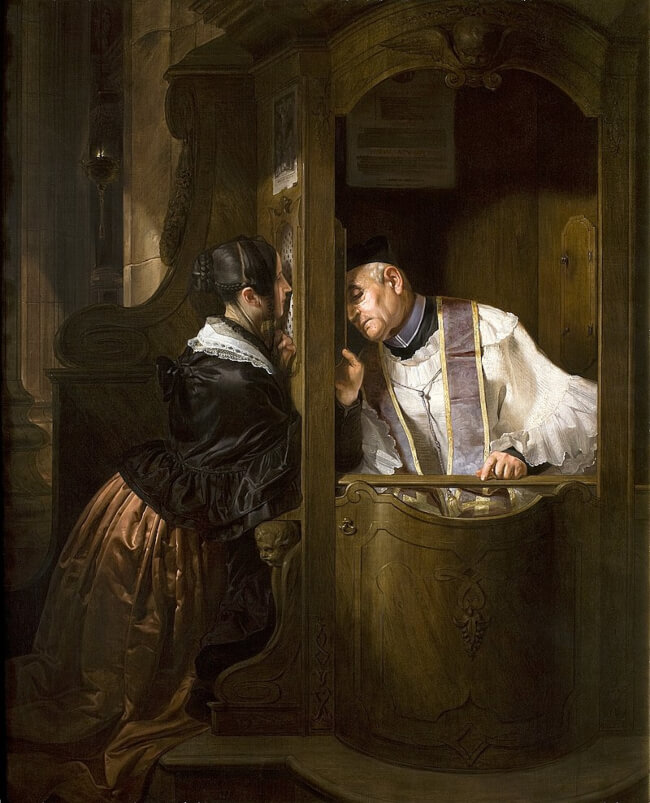How Do We Confess Without the Sacrament of Confession?
Aug 14, 2020 by Whitney Hetzel
There is no doubt that the COVID-19 pandemic has affected all of us in profound ways. We have been affected not just materially, but spiritually.
The critical spiritual effect is this: many Catholics have not been able to receive the Sacraments, and many are recognizing that not being able to receive them is its own form of sacrifice.

What Do We Do If We Cannot Get to Confession?
Many parishes have found creative ways to offer the sacraments, but there are many churches that have remained entirely closed. Even when a church is able to offer the sacraments, however, there are still many Americans who—due to their compromised health situations or the potential of contracting the virus—are unable to get out to receive them.
[[18087]]
So what can Catholics do if they cannot get to confession?
A few weeks ago, Pope Francis responded to the dilemma that many Catholics face in not being able to receive the sacrament of penance:
"Do what the Catechism (of the Catholic Church) says. It is very clear: If you cannot find a priest to confess to, speak directly with God, your father, and tell him the truth. Say, ‘Lord, I did this, this, this. Forgive me,’ and ask for pardon with all your heart."
Make an act of contrition, the Pope said, and promise God:
"I will go to confession afterward, but forgive me now."
The Catechism of the Catholic Church says:
“When it arises from a love by which God is loved above all else, contrition is called ‘perfect’ - contrition of charity. Such contrition remits venial sins; it also obtains forgiveness of mortal sins if it includes the firm resolution to have recourse to sacramental confession as soon as possible.”
What Is "Perfect Contrition"?

Father Pius Pietrzyk, OP, Chair of Pastoral Studies at St. Patrick's Seminary in Menlo Park, California, recently explained to the Catholic News Agency that “perfect contrition” is sorrow for one's sins based upon love for God, which includes the firm resolution not to commit them any more.
Imperfect contrition—also known as attrition—is sorrow for one’s sins based upon fear of the punishment of hell. It is sufficient for a priest to absolve you in the confessional, but not enough to obtain the forgiveness of mortal sin without sacramental confession to a priest, the Catechism explains.
[[919]]
Father James Goodwin, from North Dakota, recently wrote the following regarding perfect contrition and the sacrament of penance:
Perfect contrition is sorrow for our sins for the love of God — not just the fear of hell. How can we have that kind of contrition? Most importantly, it is a grace given by God, but God is not stingy with his gifts. If we sincerely want this kind of contrition, we can be sure that God will give it to us. It is not merely a feeling, but a motive. The motive of love for God does not exclude secondary motives, such as fear of hell. Therefore, make the act of contrition, which contains the promise to confess, and know that our loving and merciful God is always ready to offer the graces necessary of salvation. We can predispose ourselves to receiving his grace by the means of prayer and penance. Use this time to pray and grow closer to God. The Apostolic Penitentiary recommends such prayers, devotions and actions: 'Visit to the Blessed Sacrament, or Eucharistic adoration, or reading the Holy Scriptures for at least half an hour, or the recitation of the Holy Rosary, or the pious exercise of the Way of the Cross, or the recitation of the Chaplet of Divine Mercy, to implore from Almighty God the end of the epidemic, relief for those who are afflicted and eternal salvation for those whom the Lord has called to Himself.' Like a mother, the Church offers us Christ’s salvation even in extreme circumstances. We don’t need to despair. God is with us and wants to forgive our sins. Make the act of contrition daily and entrust yourself to the infinite mercy of God. He is with you."
So, how can we make an act of perfect contrition? Practically, there are two things a Catholic must do.
The first is to pray an act of contrition "out of love for God," says Father Pietrzyk.
[[365]]
Here are two commonly-prayed Acts of Contrition:
O my God, I am heartily sorry for having offended Thee, and I detest all my sins because of Thy just punishments, but most of all because they offend Thee, my God, Who art all-good and deserving of all my love. I firmly resolve, with the help of Thy grace, to sin no more and to avoid the near occasions of sin. Amen.
My God, I am sorry for my sins with all my heart. In choosing to do wrong and failing to do good, I have sinned against you whom I should love above all things. I firmly intend, with your help, to do penance, to sin no more, and to avoid whatever leads me to sin. Our Savior Jesus Christ suffered and died for us. In his name, my God, have mercy. Amen.
Being sorry for sin because we love God—and grieving because we have offended Him who loves us so perfectly—has often been described as having a desire to be reunited to God because of who He is. It means truly desiring unity with God, and actively putting aside the sins that stand in the way.
Second, a Catholic must make a firm commitment to go to confession as soon as it is possible.

An Act of Perfect Contrition Does Not Replace the Sacrament of Penance
Father Pietrzyk explained that an act of perfect contrition is not a replacement for the sacrament of penance—far from it:
“Even perfect contrition is never separated from the sacrament, at least in intention...if one makes a perfect act of contrition, it's not 'Oh, I don't have to go to confession anymore.' Quite the opposite. The person who says: 'I have perfect contrition, but I'm not going to the sacrament' does not in fact have perfect contrition.'"
The sacrament of penance remains the sole, ordinary means for the forgiveness of mortal sins after baptism, Father Pietrzyk says. Contrition is about conversion, he adds, which means turning away from attachment to sin and toward the sacraments.
In summary: if we find ourselves in a grave situation without access to confession, we can make an act of perfect contrition, with the intention of confessing our mortal sins as soon as we can—and God will forgive our sins. Then we must go to confession as soon as it is available, for the sake of our eternal souls.





